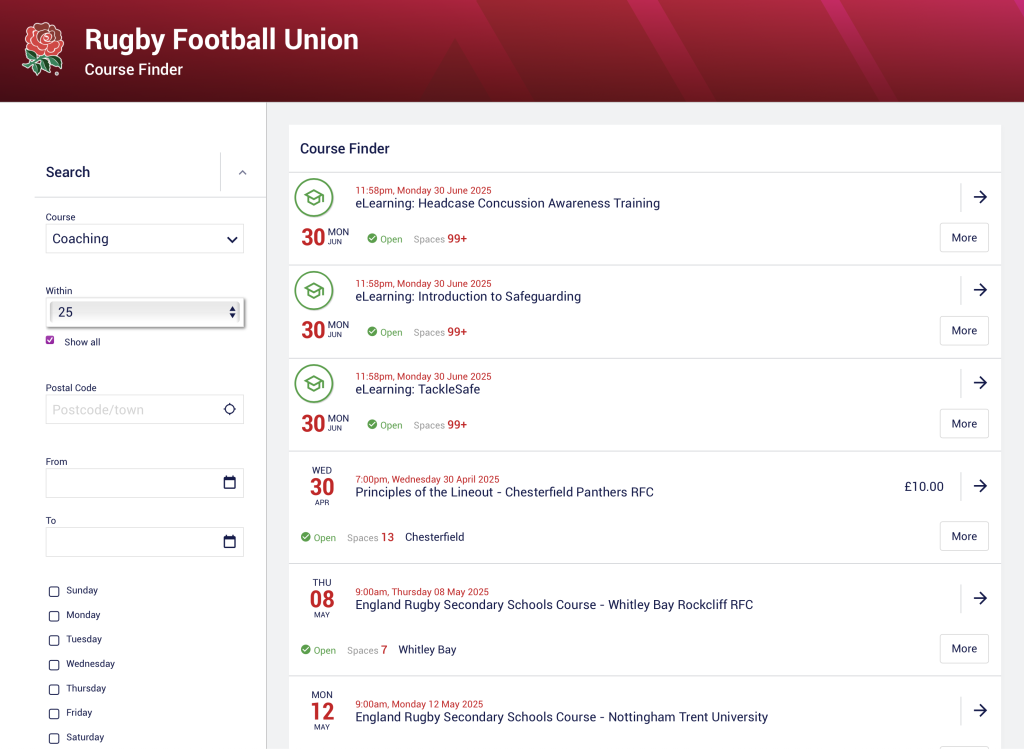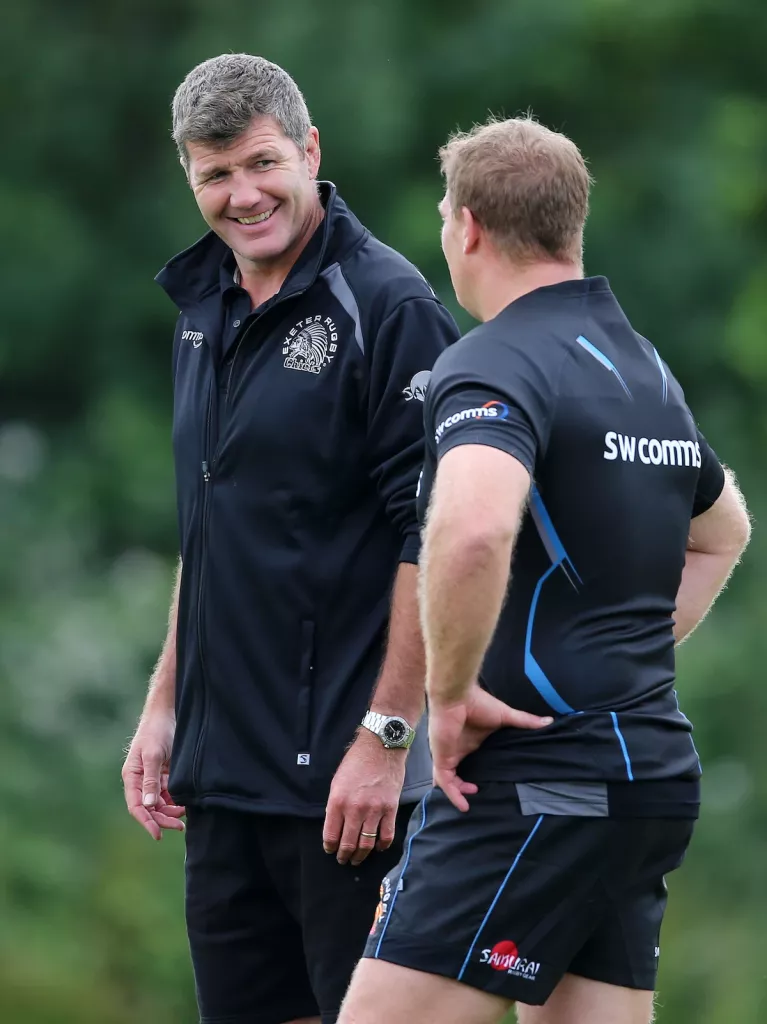Passionate About Developing Players?
Eastern Counties Rugby Union (ECRU) is dedicated to supporting both aspiring and experienced coaches throughout Cambridgeshire, Norfolk, and Suffolk.
Coaching Clinics & Courses
England Rugby (RFU) offers a variety of coaching courses tailored to different levels of experience or Age grade.
I Coach U6 - U8
I Coach U9 - U11
I Coach U12+
Advanced Coaching Award (Previously L3)
Performance Coaching Award
Director of Rugby
Continuous Coach Development
Tag Rugby Course
This non-assessed course is designed for those working in the Tag Rugby age groups.
It supports the development of active, purposeful, enjoyable and safe tag rugby environments for children. Participants will also learn the rules and practice
refereeing tag rugby.
Duration
2.5 hrs
Min age
14
First Contact Course
This non-assessed course is designed for those working with players starting out in contact rugby.
It will help participants to safely coach and referee the contact areas of the game and it is recommended that everyone coaching or refereeing contact rugby has completed this course.
Duration
5 hrs (2 Sessions)
Min age
14
First Contact Course
This non-assessed course is designed for those working with players starting out in contact rugby.
It will help participants to safely coach and referee the contact areas of the game and it is recommended that everyone coaching or refereeing contact rugby has completed this course.
Duration
5 hrs (2 Sessions)
Min age
14
Coaching Award
Competency based assessed course
Entry point for those coaching U12 and above. Provides the knowledge, skills and attributes to safely and effectively coach young players and adults.
Duration
2 days
WHEN
Day 1: Oct/Nov
Day 2: May/Jun
Min age
16
Developing Advanced Coaching Practice
The Developing Advanced Coaching Practice
course forms the pre-requisite to enrolling on to Part 2 (the assessment) of the England Rugby Advanced Coaching Award.
The course aims to develop knowledge, skills and behaviours over time by building on experiences within your coaching environment.
Developing Advanced Coaching Practice is a recognised CCD and on successful completion will be added to the candidates GMS profile.
Duration
4 days
Booking
April/May
Min age
18
England Rugby Advanced Coaching Award
On completion of the Developing Advanced Coaching Practice course coaches can enrol on to Part 2 (competency-based assessment).
This sees coaches choose a domain specific assessment focusing on knowledge, skills & behaviours. A coach will be mentored and assessed in their own coaching environment.
Duration
5 sessions
Booking
May
Min age
18
Performance Coaching Award
This programme is designed to provide both personalised and collaborative experiences for professional and expert coaches to learn, unlearn and re-learn in order to influence the game.
Coaches have to be in relevant High Performance roles to be considered and gain access to the course.
The expression of interest form has now closed for the 2025 course, but will reopen again in the summer of 2025 using the following link.
Duration
18 Months
Min age
18
EXPRESSION OF INTEREST
July - December
Director of Rugby Course
The Director of Rugby course is designed to develop and support a generation of dynamic and inspirational leaders for the game.
It is aimed at those leading rugby programmes in clubs, schools, colleges and universities. The course explores leadership and management themes set in an applied rugby context
Duration
4 Days
Min age
18
Booking From
February
TackleSafe
This eLearning course will support coaching players to become more confident and confident in the tackle through safe and effective coaching.
Duration
1 hr
Min age
14
Scrummaging
This course explores the England Rugby principles of scrummaging and is designed to help coaches, match officials and volunteers explore recent developments in scrum coaching.
Duration
2.5 hrs
Min age
14
The Lineout
This 2 hour course explores the England Rugby principles of lineout and is designed to help coaches, match officials and volunteers explore recent developments in lineout coaching.
Duration
2.5 hrs
Min age
14
U14-U18 Skill Development Programme
Open for Coaches of U14-U18 Players and focuses on the development of high quality coaching of catch and pass skills. The course explores how we use the game zone/skill zone model to introduce, develop, and stretch Players ability to catch and pass under pressure.
Duration
2 hrs
Min age
14
How To Book?
- Go to the RFU Course Finder: Click the button above to visit gms.rfu.com/GMS/coursefinder.
Search for a Course:
By Course Type: Select the ‘Coaching’ type of course.
By Location: Enter your town or postcode (e.g., “Norwich”) to find nearby courses.
By Date: Choose a date range to see courses available during that period.
Select a Course: Click on a course title to view details, including description, dates, times, location, and prerequisites.

Depending on your situation...
I'm already registered with GMS (Game Management System)
- Click “Book”: On the course page, click the “Book” button.
Log In:
Username: Enter your email address or username.
Password: Enter your password.
Click “Log In”.
Add to Basket: Click the basket icon to add the course.
Checkout:
Review Your Basket: Ensure the correct course is listed.
Click “Checkout”.
Payment:
Enter Payment Details: Provide your card information.
Confirm Billing Address: Ensure your address is correct.
Click “Pay Now”.
Confirmation: You’ll receive a confirmation email with course details.
I'm not yet registered
Click “Book”: On the course page, click the “Book” button.
Create an Account:
Click “Create Account”.
Fill in Personal Details: Name, email, date of birth, etc.
Set a Password: Choose a memorable password.
Click “Submit”.
Verify Email: Check your inbox for a verification email and follow the instructions.
Log In: Use your new credentials to log in.
Proceed to Booking: Follow steps 3 to 6 from Scenario 1.
I forgot my password
Click “Book”: On the course page, click the “Book” button.
Click “Forgot Password?”: Located below the login fields.
Enter Email: Provide the email associated with your account.
Check Email: You’ll receive a link to reset your password.
Reset Password:
Click the Link: In the email.
Enter New Password: Choose a new password.
Confirm Password: Re-enter the new password.
Click “Submit”.
Log In: Use your new password to log in.
Proceed to Booking: Follow steps 3 to 6 from Scenario 1.

Mentorship Opportunities
We believe in the power of mentorship to elevate coaching standards.
ECRU facilitates connections between developing coaches and experienced mentors who offer guidance, share insights, and support professional growth.
If you're interested in in our mentorship program, please contact our Coaching Development Lead:
